Peter MALONE
Saturday, 18 September 2021 19:27
Boiling Point
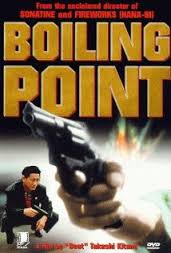
BOILING POINT
Japan, 1990, 96 minutes, Colour.
Directed by Takeshi Kitano.
Boiling Point is the second feature made by actor turned director Takeshi Kitano. He also writes his own screenplays. His first, Violent Cop, was a parallel (and parody) of the Charles Bronson, Clint Eastwood Dirty Harry police films about social corruption and the right wing, fascist style police handling the situations. His other films include A Scene at the Sea, an entirely different kind of film – a moving, lyrical portrayal of a polite young Japanese girl in learning to surf.
Boiling Point begins as a story about young people playing baseball in the Tokyo suburbs but then introduces the gangsters, and the film becomes something of a parody of the violent thrillers from the U.S. The film is difficult to
follow and indulges in some eccentric violent sequences. However, the opening sequence and the final sequence with Takeshi in the toilet on the baseball field and coming out, and makes one realize that the whole enterprise might be a fantasy.
From the mid-1990s, Kitano became a worldwide respected director (Hana-bi, The Dolls, Zatoichi).
1. The work of Kitano, the American models, fast action storytelling about Japan? Non - Japanese audiences?
2. The world of Tokyo and its suburbs? The musical score?
3. The title and its focus, Japanese society?
4. The opening with the ordinary playing of baseball, the local players, the difference between the two teams, Masaki and his poor playing, the coach, the fans? The friends? The competitiveness? The reprisal of the baseball theme, his success albeit put out by the umpire for running so fast and overtaking the previous player? The return to the baseball at the end?
5. The emergence of the gangsters, the garage, the attack, his breaking the gangsters? Standover tactics, the garage? The boss of the cafe and his reaction to the teenagers, the violent reaction and threats? The background of gangster-bashing of local identities? the meetings? The obsequious response of the garage owner and his staff? The local gangster on Okinawa and his having to pay back? the errand for a finger to be presented? the portrait of American gangsters different from the expected American gangsters, their credibility?
6. Masaki, quiet, his work, practising with the baseball? Dates, his friendship with the girl in the cafe, outings? His friend from the team? The relaxation together, going fishing, the beach?
7. The possibility of buying guns in Okinawa, Masaki and his friend going, their meeting up with the local gangster and his henchmen? The cafe, the behaviour, sexual advances? The club and the dancing? The singing? The return to the apartment, the bizarre sexual behaviour? The buying of the guns - and the shooting of the American gun runner? the behaviour in the fields - picking the flowers and crowning himself? The mad gangster - and his brutal behaviour with his girlfriend? attacking his girlfriend for the sexual encounter, attacking her? Continually picking on her? The final sexual encounter before confronting the gangsters? his friend and his chopping off his finger? Buddies? The confrontation with the gangsters, the flowers, the accidental going off of the machine gun, the massacre of the people, the rape of the girl? At the airport - and the gangster and his friend being massacred?
8. Masaki and his friend returning home, confronting the gangsters? The gun not working? Their smart technique of getting the gun through customs? The awkwardness of the group and their being bashed, Masaki running away, with his girlfriend and the danger, the explosion and destruction? The death wish?
9. The range of characters, the gangsters and their types and behaviour, the baseball players, the ordinary friendliness in the neighbourhood? Shops? Okinawa and its contrast? The final focus on the fantasy - What if...?
Published in Movie Reviews
Published in
Movie Reviews
Tagged under
Saturday, 18 September 2021 19:27
Back to the Beach
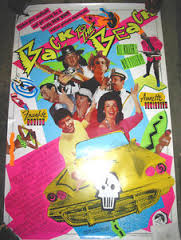
BACK TO THE BEACH
US, 1987, 92 minutes, Colour.
Frankie Avalon, Annette Funicello, Lori Loughlin, Connie Stevens.
Directed by Lyndall Hobbs.
Back to the Beach is a piece of mindless nostalgia, an opportunity for middle-aged people to see the hero and heroine of the '60s past, Frankie Avalon and Annette Funicello, going back to the beach.
The film was directed by Australian Lyndall Hobbs, features the stars who coproduced the film as well as a number of young stars - with guest appearances for old times' sake by Connie Stevens, Edd Byrnes and a number of stars of the past, including Alan Hale. 0.J. Simpson also puts in a humorous turn (which be was to elaborate in the parody, The Naked Gun).
The plot is as old as the hills - rather square parents, caught up with busyness and family, going to the west coast to their past, to check out on their daughter. She is living with a boy and the father reacts. He meets an old flame and the irony is that their daughter is in love with her son. There are set-ups and jealousies, dancing on the beach, a surfing competition and singing and dancing - all in the old style. The final comment of the film rings-true, tongue-in-cheek, as Annette Funicello asks us if they aren't the corniest of couples. And the answer, of course, is yes. An exercise in '80s nostalgia for the '60s.
1. Entertaining comedy? Musical? Old-fashioned plot updated-to the '80s?
2. The world of Ohio, the world of California, the beach, singing and dancing, surfers, glamour? The musical score, old and new songs? Dancing and choreography?
3. The title and an exercise in nostalgia? The young son explaining the impact of Frankie Avalon and Annette Funicello at the beginning? The scenes from the past? Recapturing the past?
4. The sketch of Frankie and his business, the memories of the Big Kahuna, his being the square father about his daughter, hounding Michael, teaming up with him again, making Annette jealous, seeing Connie once again? The corniness
of the competition? Reconciliation? Annette as the perfect mother, memories of the past, trying to make her husband jealous, shopping, support of her daughter? The beach boy and trying to make Frankie jealous?
5. Connie and her being the mother of Michael? The California life? The man in charge of the beach? The old characters from the past? From Gilligan's Island?
6. The youngsters: Sandy, her relationship with Michael, living together, wanting to get married, confusion, the parents, hero and heroine?
7. Bobby as the knowing young kid, his being ashamed of his parents, making the commentary, embarrassed on the plane? With the bikies? Telling stories? The happy ending?
8. The satire on the beach boy with Michael but especially with Troy?
9. The guest stars, their comic turns?
10. American nostalgia? The perspective of the '80s on the '60s and their innocence?
Published in Movie Reviews
Published in
Movie Reviews
Tagged under
Saturday, 18 September 2021 19:27
Back to School
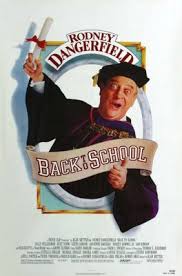
BACK TO SCHOOL
US, 1986, 96 minutes, Colour.
Rodney Dangerfield, Keith Gordon, Sally Kellerman, Burt Young, Robert Downey Jr, Adrienne Barbeau, Ned Beatty, Kurt Vonnegut..
Directed by Allen Metter.
Back to School is much more enjoyable than it sounds. It is a star vehicle for comedian Rodney Dangerfield (Caddyshack, Easy Money). He is a larger than-life and boisterous character - but is made human and his slapstick and farcical humour has the humane edge.
The film is very similar to a lot of the campus comedies designed for teenage audiences of the '80s. However, with the focus on the grandfather figure, it has something to offer all generations. Often the humour is slapstick with a touch of crudity, but it is generally good-natured and often quite funny.
Rodney Dangerfield is very good in this film, more acceptable perhaps than in others. He has a very good supporting cast including Sally Kellerman as an English professor with Keith Gordon as his son and Robert Downey Jnr as his friend.
1. Enjoyable American slapstick comedy? Campus story? Teenage audiences? Older audiences? The traditional campus film?
2. The background of the credits sequence: the history of Melon's life, poor background, the '40s, his growing up, his establishing an empire, a family? His achievement? His lack of educational achievement? The presentation of his home, wealthy wife? His son's world? The background of the university and its campus? Musical score and the range of songs?
3. The title and expectations? The humour for the adult to go back to school, his handling of the studies, campus life, staff? Livening things up? The effect for the younger generation?
4. Thornton Melon as a character: his background, his experience, success and achievement? Loud and in bad taste? His visit to Jason? His decision to go to college? His enrolment, classes, assignments? His interest in Dr Turner? Studies? Dr Barbay and his hostility? His delegating his work to paid writers? The irony of his essay on Vonnegut being written by Vonnegut himself - and getting a Fail? His looking for his son, trying to help him, his diving failure? The parties and his being the centre of life? The build-up to the exams, the possibility of failure and expulsion? The clashes with Diane? The build-up to the diving competition, his successful dive? The life of the party? The more humane edge as he dealt with his son's problems, in relationship with Diane? The speaking of Dylan Thomas? 'Do not go gentle into that goodnight .... '?
5. Jason and the younger generation, the 'nerd'? His relationship with his father, not succeeding in college, intellectual success, failure in the diving team? His wanting to make an impression on Valerie? The clashes with Chas? His being the towel boy? The diving competition, his belly-flop? The clash with Chas? His helping his father with his work? Amazed at his father's behaviour? His final success? Winning Valerie? His relationship with Derek?
6. Derek and his punk style, the campus comedian? Relationship with Jason, with Thornton? With Chas and Valerie? His providing the comeuppance for the arrogant types?
7. Dr Turner and her classes, the impact of Thornton, the relationship with him, its ups and downs, her wanting to fail him. his rendition of the poem? her failing Vonnegut's essay? The reconciliation? The contrast with his first wife and her selfishness, taking him for all he had?
8. The presentation of Lou and his relationship with Thornton, helping him, doing his jobs for him? The irony of Bert Young's sloppy style with the campus atmosphere?
9. The presentation of the university staff, especially Philip Barbay and his arrogance, his relationship with Diane? The sports coaches? The Dean - and his smooth talk, hoping for the money from Thornton? Dr Barazini?
10. The presentation of the students, Chas and the jocks, Valerie as the school princess? The contrast with the nerds? The conflict and confrontations? Chas and the fight with Jason, having to pull out of the diving? One-upmanship?
11. The verbal humour, visual humour, slapstick and farce? Broad American humour? A piece of Americana?
Published in Movie Reviews
Published in
Movie Reviews
Tagged under
Saturday, 18 September 2021 19:27
Belle of the Nineties
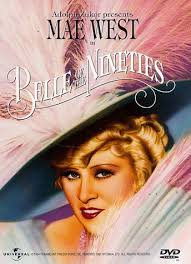
BELLE OF THE NINETIES
US, 1934, 75 minutes, Black and white.
Mae West, Roger Pryor, John Niljan, John Mack Brown, Katherine de Mille, Duke Ellington, and his Orchestra.
Directed by Leo Mc Carey.
Belle of the Nineties is an amusing Mae West comedy.
However, it ran into trouble with the censors in the '30s and some of its dialogue and scenes were cut. The screenplay is by Mae West herself, as was the case with all her films. It presents the stereotype of the blonde wearing '90s boa, feathers and elaborate dress. It also presents the stereotype of the blonde femme fatale - with a line in wisecracks. Points are made at the expense of this society and respectability, of men - some dashing, some crooked.
The film was directed by Leo Mc Carey, a Marx Bros director with Duck Soup. He was to go on to many popular films, including The Awful Truth, Love Affair, Going my Way.
1. An entertaining comedy? Mae West's presence and writing?
2. 'Thirties style: black and white '90s, New Orleans? The musical in the centre?
3. Leo Mc Carey as a director of comedies moving to make a number of celebrated films Going My Way, The Bells of St. Mary's.
4. Black and white photography, the atmosphere of the score? The songs? 'When a St. Louis Woman Goes Down to New Orleans', 'Old Flame'?
5. Mae West and her style, presence, dialogue, humour, puns, irony, innuendo? Her physical appearance and her exploiting this? Gowns and the 1890s style? Theatrical glamour? Her character of Ruby Carter? Background in St Louis, in New Orleans, with society, theatre, gamblers, the gentry? Ruby as a wisecracking survivor?
6. The men in her life: at the theatre, gambling, high society? The men as foils to her? Romance? The battle of the sexes, Mae West style? Tiger Kid in comparison with Brooks Clayborn? Ace Lamont?
7. The atmosphere of the theatre, style and glamour? High society and their response to Ruby? Newspapers etc? The theatrical style, Mae West's comedy? Wit, sex - entertainingly provocative?
Published in Movie Reviews
Published in
Movie Reviews
Tagged under
Saturday, 18 September 2021 19:27
Believers, The
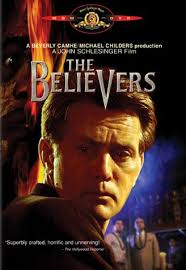
THE BELIEVERS
US, 1987, 114 minutes, Colour.
Martin Sheen, Helen Shaver, Harley Cross, Robert Loggia, Elizabeth Wilson, Harris Yulin, Richard Masur, Lee Richardson, Jimmy Smits.
Directed by John Schlesinger.
The Believers is an occult thriller of the mid-'80s. In content it seems more of a '70s film in the vein of Rosemary’s Baby, The Exorcist and The Omen and the many derivative films.
It is well done of its kind. It was directed by John Schlesinger who has an impressive number of films to his credit including Midnight Cowboy. There is an excellent role for Martin Sheen as the father (like Gregory Peck in The Omen) who is brought to the brink of killing his son.
Eerie special effects are employed for the exploration of black magic and the Cuban ancient religion blended with Christianity, Santeria.
Many critics dismissed the film as yet another occult film, perhaps expressing dislike of the genre. But, if the film is looked at on its own merits, it combines the mysterious occult with an atmosphere of realism. The film makes comment on New York City, its cosmopolitan nature, the religious beliefs in the cities and the consequences for the police.
1. An interesting film of the occult and religions? Contemporary story? In the tradition of other occult films?
2. The work of John Schlesinger, his films and observations of the United States? The New York atmosphere? Migrants, the police, crime? Religion, psychology and scepticism? Financial power?
3. The special effects, the editing for primitive religious, rituals, Santeria? Shocks and violence? The musical score and its variety?
4. The title of the original novel, 'The Religion'. Comparison with the film's title? The focus? The atmosphere of the cults with the ceremonies, Santeria? Children with the cult figures in the United States and the various other -incidents of child sacrifice?
5. The introduction to Cal, his jogging, ordinary family life, his wife and the breakfast, Chris and his slowness? The suddenness of the death with the electric shock? The effect on Cal and Chris? Having to cope?
6. Going to New York, Cal and his work of counselling the police, the session? The apartment, meeting Jessica with her eccentricity? Carmen and her looking after Chris? New life? in Central Park? The murder and Chris finding the shell? The interview with Marty (and his tricks and his willingness to help?
7. Jessica, her style, Cal and his seeing her, the lost purse, their relationship, sexual? Memory of his wife? Chris and his anger? Buying the toy and smashing it on the road, his running through the cars, Cal chasing it? His later reconciliation with Jessica?
8. Dennis and Kate, the long friendship, friendliness, the slide night and the memories of going to the Indian reservation, the memory of Cal's wife? Their care of Chris during the holiday? There memory of their being the young couple -in the credits? The power of Santeria, wanting Cal to become part of the religion? Kate and her charge of heart and her being killed?
10. McTaggert? as a New York cop, his style, his consulting Cal, going to the theatre and seeing the massacred boy, the effect on Tom Lopez and his holding the gun? Lopez and his fears? His escape? His pains and the snakes? The spells, killing in the diner? McTaggart? and his theories about Lopez? His friendship with Cal, his drinking, his Catholic background? His being under a Spell? Ringing Cal, his being unable to move in his own apartment? His threatening to kill himself and his act of contrition? Cal taking the gun? His misery as he took the other gun, and the police?
11. The film's introduction of Santeria and its traditions, Cal and his books, old gods turned into Christian saints? Carmen and her being a devotee, the spells and various objects to save Chris's life? Cal and his hostility towards them? His suspecting Carmen concerning Chris and firing her? Sezine and his fear? Interviewed by McTaggert? at the drug rehabilitation centre? Calder's party? The decision for Sezine? Cal and Jessica, Sezine, going through the Santeria ritual with its kneeling, blessings and the cock's blood poured over them?
12. Calder and his patronage, the fame and magazine covers, the party, meeting Cal and Jessica, the growing frenzy of the African man, Cal and Jessica leaving? The story of the death of his son? His friendship with Dennis and Kate? The truth about his power? His power for Cal to kill Chris? The pursuit to the factory? His taking Chris after the ceremony? The confrontation with Cal and his death? The various couples who had sacrificed their sons and their being present at the ritual?
13. Cal as a police psychologist, coping with his wife's death, friendship, to cope with the affair, Jessica? His concern about Tom Lopez and going to him at the diner? His support of McTaggert? The two dead bodies? The visit to Sezine, studying Santeria? Going to the party? His pleading with McTaggert? and sharing the act of contrition? Jessica and her illness? Going to Dennis's place, his being drugged, getting help, with the documents, the ritual and his killing Dennis, fighting, the confrontation, the Santeria shrines and Jessica's putting them in the barn?
14. The portrait of Chris, young child, love for his father, his mother's death, attitude's towards Jessica, friendship with Dennis and Kate, holiday and fishing? In the ritual? His luring the African to his death? The finale and the barbecue?
15. The African, the boy of the credits, his power, going through Customs, the rituals, his eyes, his frenzy at Calder's party, his killing Kate, taking Chris, the final confrontation and his death?
16. Marty and his friendship, his tricks, his helping Cal? observing the ritual, his death?
17. Jessica and her friendship, artwork, buying the toy for Chris, affair with Cal? Going to the party, the powder on her face? Participating in the ritual with Cal? Her growing ill, the spiders on her face? The irony of the ending and her shrine to protect them?
18. An effective thriller? Psychological and crime drama? Exploration of contemporary superstitions and religions?
Published in Movie Reviews
Published in
Movie Reviews
Tagged under
Saturday, 18 September 2021 19:27
Beautiful End of the World, The
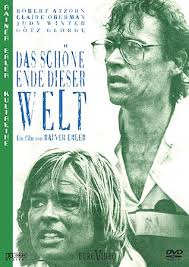
THE BEAUTIFUL END OF THE WORLD
Germany, 1984, 90 minutes, Colour.
Directed by Rainer Erler.
The Beautiful End of the World is a German telemovie seriously concerned about conservation issues. However, the title refers to Australia and uses Australia and its openness and vastness as a symbol for innocence and corruption in terms of industrial pollution. The characters and the action are rather melodramatised - not particularly persuasive dramatically. Moreover, the message behind the film is certainly very earnest. There are attractive scenes of Perth and Western Australian locations. Direction and writing is by Rainer Erle who showed a similar concern in the more densely plotted and concerned film set in South America, Plutonium.
1. An interesting drama about conservation and pollution issues? German television film-making? For German audiences? World-wide?
2. The background of German sequences and those in Singapore (with tourist location sequences)? The Australian locations, Perth, the Outback in Western Australia?
3. The opening of the film with the Australian group singing the song about conservation? The praise of Australia, the lyrics, conservation concern? Ruben and Brant listening and going to Australia, industrial deals, production of pesticides? The visuals of the German freeway and factories and pollution? The comments about the banning of pesticide production in Europe and in other countries? Intentions to exploit Australia? Secrecy?
4. Tichmel Brant and his ideas, going on the mission? The flight, encountering Elaine, asking her to show him round? The taxi and his being taken to the house and being bashed? Hospital, police interrogation? identifying Elaine? Going to the business office, the real estate deals? Contacts in Sydney?
5. The land and its terrain, the possibilities of building processing works? Australia and the vastness of its population, the isolation of Perth? Government reaction, international laws, the time taken for governments to register protests - and the possibilities of exploitation?
6. Craig and the gang, the attack on Brant? Bashing him? The threats? The fire, Elaine and the rescue? Going off secretly with Elaine, companionship, hotel, sexual relationship? (Credible in such a quick time?)
7. The discussions with Elaine, his gradual change of heart, the encounters with Craig?
8. Ursula's arrival, her hostility, suspicions? The clash between the two? Working together? Their being taken, left stranded in the Outback, finding the house, the water, the helicopter chase and rescue?
9. Michael and Ursula and the talking of issues, pollution, chemicals, finance?
10. Craig and the explanation, Michael needed as witness? The two toughs being in the employ of a rival chemical company? Michael's change of heart, the visa for Singapore, money deals and arrangements, the return?
11. Meeting Elaine, the decision to start a new life in Australia? How persuasive the situations and characters? How important the message?
Published in Movie Reviews
Published in
Movie Reviews
Tagged under
Saturday, 18 September 2021 19:27
Beast Within, The

THE BEAST WITHIN
US, 1982, 98 minutes, Colour.
Ronny Cox, Bibi Besch, Paul Clemens, Dong Gordon, R.G.Armstrong, L.Q.Jones, Luke Askew.
Directed by Philippe Mora.
The Beast Within is a variation on the Living Dead- Vampire thriller. It was written by Tom Holland (Psycho 3, Fright Night). It was directed by Philippe Mora, the Australian director of such documentaries as Brother Can You Spare a Dime and Swastika, as well as such features as Mad Dog Morgan, The Return of Captain Invincible as well as The Howling sequels.
The film is set in a small American town and seems to be an allegory of inbreeding, crime in the small American town and its cover-ups. It has a strong gallery of character actors in the supporting cast, including Logan Ramsay as an editor, Don Gordon as a judge, Luke Askew as the undertaker, L.Q. Jones as the sheriff and R.C. Armstrong as the doctor. Ronnie Cox and Bibi Besch are effective as the parents and Paul Clemens appears as the tormented son.
The film relies on some horror suggestion as well as some special horror effects of the transformation of the son into the monstrous beast.
Some audiences will find these sequences ugly - but the film is not a bad variation on the monster theme and has some comment on the American small town.
1. The impact of the film, horror, monster, the small American town, crimes and cover-ups?
2. The location, the town, the swamps, the interiors? Day and night? The special effects and the transformations? The eerie musical score?
3. The title, the focus on Billy Conlon and his becoming a monster, the family persecuting him? The rape, his possession of Michael and manifesting himself? The analogy of the cicadas shedding their skin and the cicada-like make-up for the monster?
4. The plausibility of the plot, the crime, the cover-up, the small inbred American town? The suggestions of menace and violence? The actual monster ani the possession of the boy?
5. The opening, the couple driving along in the'60s, the flat tyre, the wife, the rape and the transformation? The problem later, their ill son? Their concern, the father and his frantic investigations, his participation in the action in the town, confrontations, grief at his son's condition? The mother and her concern, interrogating people in the town, catching helplessly the final shooting?
6. The character of Michael, seeing him unwell, coming to the town, audience suspicion, the gradual transformation, the killings, his feeding on human flesh and recovering, not wanting to leave the town, confronting the parents, the attraction towards Amanda, the clashes with her father, warning her to leave? his wanting to die, being transformed into the monster, going on the rampage? The killings? The character of Billy Conlon, the revelation of his story, the family cruel to him, his death, feeding on human flesh? Billy Conlon's revenge on the family?
7. The gallery of characters within the town, their relationship, their secrecy on interrogation, the vengeance: the editor, his taking Michael in and giving him the deal, his death? Dexter ane the undertaker, his wanting to bribe the judge, his death? The judge and his cover-up, the terror, going into the cell and being taken through the wall? The sheriff and his investigations, his assistant? The doctor and his concern, advice?
8. Amanda, the attraction towards Michael, the brutality by her father, the story of the father's violence towards her mother and her lover, the suggestions of incest, his brutality towards his daughter, the attacks on Michael? Amanda and Michael going for the walk and finding the bones? Michael's desperate warning for Amanda to leave, her going, the crash, her being saved, the violence?
9. The film's comment on American towns, their inbreeding, the effect on the inhabitants, the presenting of things monstrous? The outsiders and their intrusion? Resentments? The possession of the innocent victim and his destruction?
Published in Movie Reviews
Published in
Movie Reviews
Tagged under
Saturday, 18 September 2021 19:27
Baltimore Bullet, The
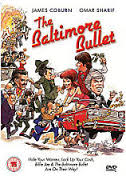
THE BALTIMORE BULLET
US, 1980, 103 minutes, Colour.
James Coburn, Omar Sharif, Bruce Boxleitner, Ronee Blakley, Calvin Lockhart.
Directed by Robert Ellis Miller.
The Baltimore Bullet is a film about pool hustlers. It is reminiscent of The Hustler (many critics thought the parallels too close) but the film does not have the earlier film's dramatic impact. Instead, The Baltimore Bullet seems to be a confrontation between James Coburn and Omar Sharif with some gangster and drug sub-plots added in.
The stars are their usual selves. Bruce Boxleitner (Scarecrow and Mrs King, Tron) is an engaging pool novice. Ronee Blakly comes in with some songs. Calvin Lockhart is a drug dealer and Jack O'Halloran is a giant sized hood. The film incorporates a lot of local colour.
Direction is by Robert Ellis Miller (The Heart is a Lonely Hunter, Buttercup Chain, Girl From Petrovka, Reuben Reuben).
1. An enjoyable piece of Americana? A film about gambling? Gangsters?
2. Location photography, New Mexico, Hem Orleans? Local colour - the jazz funeral etc.? The atmosphere of poolrooms? Prisons? Drug dealing? Musical score? Ronee Blakly's songs?
3. The title and the dynamic thrust of the title? Verified in the file?
4. The focus on Nick Casey? Pool champion? Winning cups? Wanting money? The desire to challenge the Deacon? The trip to New Orleans? His refusal to play Nick? His wanting Nick to win in Johnson City? The huge money stake? Nick and Bill following him? Their hustling to raise the money? Billie Joe losing the money at poker? Billie Joe and the drug entanglement with Snow White? Nick rescuing him, taking Snow White's money? Carolina Red and her childhood crush on Nick? Johnson City, the pool competition? The irony of the Deacon being pursued by Max? Max threatening Nick with death because he bet on Billie Joe? The complications with Max's arrest? Nick beating Billie Joe (despite Billie Joe's urging him to lose)? Nick and the Deacon finally playing their game for a high stake? Nick winning? James Coburn's grinning style?
5. Omar Sharif, the champion, the nickname, buying his way out of jail? his aloofness from Nick? The entanglement with Max? The Deacon having Max jailed? Max and his bets? The Deacon using the Senator to get rid of Max? The final game and the Deacon's defeat? Omar Sharif's grinning style?
6. Billie Joe and his enthusiasm, a junior Nick, hustling with him, admiring him, sharing the adventures, the poker games and the loss of the money, the dealings with Snow White, the violence and the danger, the encounter with Max, trying to beat Nick, the finale? Billie Joe's becoming Hick in a couple of years?
7. Carolina Red, her father, the poolrooms, the crush on Nick, Billie Joe's attentions? Her travelling with the group? Ronee Blakly's song?
8. Snow White and the drug dealers, money, violence?
9. Max as the giant gangster, imprisonment, getting out, revenge on the Deacon, betting on Billie Joe, his arrest?
10. The portrait of poolroom players? Barflies? People betting? Drug dealers? An authentic background?
11. The screenplay and its cliches, innuendo, corn? A piece of gambling Americana?
Published in Movie Reviews
Published in
Movie Reviews
Tagged under
Saturday, 18 September 2021 19:27
Bad Seed, The / 1985
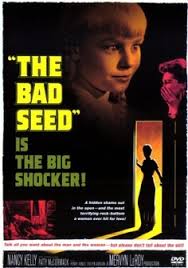
THE BAD SEED
US, 1985, 100 minutes, Colour.
Blair Brown, Carrie Wells, David Carradine, Richard Kiley, Lynn Redgrave, David Ogden Stiers.
Directed by Paul Wendkos.
The Bad Seed is a telemovie remake of the 1956 Mervyn Le Roy version of Maxwell Anderson's play. The film is glossy in style and geared for the television audience.
However, it is a fairly faithful remake of the 1956 film. Blair Brown is persuasive in the central role of Christine. Carrie Wells emulated the sinister presence of Patty Mc Cormack in the original. David Carradine is more sleazy and suspicious than Henry Jones in the original. The neighbour, Monica, is much more glamorised with Lynn Redgrave and David Ogden Stiers as her husband rather than brother. Richard Kiley has a strong presence as Christine's father. There is not such an emphasis on Claude's mother as there was in the original.
The film is updated to the 80s, however there are the same discussions about heritage and socialising for criminal behaviour. However they are couched in an '80s style which makes some impact. Direction is by Paul Wendkos.
1. Impact of the film? Shock value? Audience knowledge of the play or the original film? The focus on human nature, psychology, sociology?
2. The adaptation of the play and the updating of the film? The strong cast, the opening out of the play, the flashbacks and suggestions? Explicit rather than off-screen? The opening out of the play?
3. The importance of the return to the original ending and its chilling reality?
4. American telemovie style, glossy atmosphere, colour? interiors and exteriors? the opening out of an interior study and showing what actually happened, especially with the little boy's death? Face and atmosphere? musical score and mood?
5. The significance of the title, the focus on Rhoda, the theories, the pros and cons of psychology and sociology? Theories of the '50s interpreted by the '80s? The greater pessimism of this version?
6. The plausibility of the plot: the focus on Rhoda and her behaviour, her heritage? her criminal behaviour? The bypassing in Christine s generation?
7. Rachel and her appearance, age, seen as perfect? Good impressions? Her love for her mother? Her manoeuvring her mother? Monica and her husband and spoiling her? Leroy and his presence, sinister attitude and suspicions? The story of the medal, the dramatising of it, the beach, Rachel and her attack on Claude, killing him? Her callous behaviour afterwards? Concealing the truth? The concern of the school? Her lies? Monica and the outings? Leroy and his suspicions, taunting her, threatening her, trying to make her afraid? Killing him? The dramatising of the early murder and the woman in the ice? Her mother and her trying to cope with her, desperation, the pills and killing her? The heredity theory?
8. Christine, trying to cope, relationships, love for her father, dependence on him, her finding out the truth? The adoption? Her criminal mother? Her concern about the theories? Discussions with Monica? Friendship with her? The picnic, her reaction to the little boy's death, finding the medal? suspicions about her daughter, yet her love for her? The lies? Her father and the truth? Phone calls? Leroy's death? kill her daughter, killing her, shooting herself?
9. The little boy and his death, Rachel's cruelty? The children, the teachers and their concern, parents?
10. Monica and her garrulous style, friendship, love for Rachel, care for Christine? her husband?
11. Leroy's presence around the house, sleazy, suspicions of Rachel, interrogating and taunting her, his violent death?
12. The grandfather, his concern, the truth and his reluctance to tell it?
13. Themes of death, cruelty? Motivation? Blame? Christine's decision to end her daughter's life? Audience concern about psychopathic behaviour?
Published in Movie Reviews
Published in
Movie Reviews
Tagged under
Saturday, 18 September 2021 19:27
Bad Seed, The / 1956
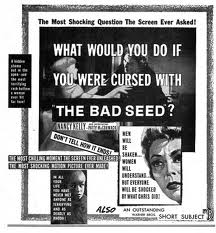
THE BAD SEED
US, 1956, 129 minutes, Black and white.
Nancy Kelly, Patty Mc Cormack, Henry Jones, Eileen Heckhart, Evelyn Varden, William Hopper, Paul Fix, Jesse White.
Directed by Mervyn Le Roy.
The Bad Seed is based on a novel by William March and the play by Maxwell Anderson Winterset, Joan of Lorraine). This film version, directed by Mervyn Le Roy, uses many of the cast from the stage production, especially Nancy Kelly in the lead as Christine. Patty Mc Cormack is very effective as the evil little girl. There is an interesting supporting cast including Eileen Heckhart as the alcoholic mother of the dead boy, Evelyn Varden as the good-natured neighbour. Henry Jones as the mad handyman.
The film explores the question of heredity influencing people and their criminal behaviour - or whether individuals are influenced by environment. While characters, especially the grandfather played by Paul Fix, argues for environment, the film indicates that it believes in the heredity theory.
The film shows an angelic-looking but conscienceless little girl who murders those who get in her childishly selfish ways. This is quite horrifying. The distraught mother tries to understand and cope - with some complications about the mystery of her own heredity and her dreams. The ending of the play is quite striking with the mother killing her child and killing herself, but with the child being rescued in time and recovering. This was changed completely by censorship regulations of the 50s so that there is a very contrived ending with the mother surviving and the little girl going to the scene of her cries and being literally, struck by lightning.
A remake in the '80s restored the original ending and remained close to the outline of the original - except for making the family a little bit more upmarket and the dowdy neighbour becoming a much more glamorous Lynn Redgrave. In the remake, Blair Brown is effective as the mother, David Carradine is sinister and sleazy as the handyman, Richard Kiley is good as the loving grandfather. The little girl is played by Carrie Wells.
1. The impact of this film? Its shocks? Psychological theories, sociological theories? insertion of the dark side of human nature?
2. The adaptation of the play for the screen: dialogue, opening out, the cast, the interior scenes, acting styles? Musical score?
3. The changed ending and the '50s? Its impact on the overall drama?
4. Black and white photography, interiors and exteriors, an interior drama? Pace? Musical score and mood?
5. The title and the theories, the dialogue and the pros and cons, the psychological understandings and stances of the '50s, in the perspective of later decades? dramatising the fears? The basic pessimism within the story?
6. The plausibility of the plot: Rhoda as a credible young girl, her mother, background of her criminal mother, the manifestation in successive generations?
7. Rhoda and her appearance, age, her being called perfect? The impression she made on people, curtseying and old-fashioned manners, wearing a dress instead of jeans? Her relationship with her mother, with Monica? Her nastiness towards her? knowing more about her than others? The story of the spelling medal, the audience knowing what happened? Her asking for a peanut butter sandwich after the killing? The importance of the true story and her gradually telling it? Her malice, her attack on the boy, her fight with him, hitting him with the shoe, taking the medal? The teacher and her concern, her arrival, the discussions with Christine, the suspicions concerning Rhoda? The plight of Claude's mother? Her arrival and behaviour? Rhoda with her lies, games, seeking her mother's affection? Not comprehending any guilt or remorse? Her relationship with Monica, Monica spoiling her? the lifts? Leroy and the tantrums, her playing tea party and his insinuations about the blood? Her fear about the shoes? Leroy and his working out the truth, and his being frightened? The coolness in killing Leroy and the horror of his death? hr playing the piano? the story of the early murder and the old lady? Her trying to please her mother, the relationship with her grandfather? The pills, the story-reading? The irony of her surviving? her questions to her father about Monica's bird and how long she would live? Her going to the pier to look for the medal, her death? The theory of heredity and evil? Rhoda blaming others for their own deaths?
8. Christine, the phone calls, discussions, Monica, asking the expert, with her father, loving mother, relationship with her husband, his absences, Love for Rhoda? Her own dream, the psychological diagnosis? The fear of adoption? Her father's arrival, love hiding the truth? His cover? Her worry about theories, with Monica and her brother? The discussions with the expert presence? her attitude towards Leroy and disdain of him? The picnic, her reaction to the news of the death, the and her concern, wanting to support tie school, the wreath? Rhoda's being eliminated from the school? Her concern about Claude's parents, the mother arriving, her drunken turn and accusations, Christine's trying to behave well? Finding the medal, the confrontation with Rhoda, the lies? Trying to cope, her father's visit, the worry, the phone calls? Claude's mother and her reappearance? the attack's on her health, class? Leroy' death? the piano-playing? Interrogating Rhoda about the old lady's pills, reading the story to her? The motivation for the killing?
9. Claude's mother: drink, only child, her background, her small husband, attack on class and style, her needs, wanting to interview Rhoda?
10. The teacher, the interrogation of Christine, her primness, suspicions and suggestions? The attack by Claude's mother?
11. Monica, her excessive love for Rhoda, spoiling her? Her psychological interests, Freud? Her brother? The visiting expert?
12. The atmosphere of psychology, the discussions and screenplay? Freudian theories?
13. Christine's father, his background, journalist, the irony of the expert recognising him and the test case, listening to Christine's nightmare, telling her the truth?
14. An atmosphere of sinister death? Cruelty? Callousness?
15. The changing of the play's ending for the censorship requirements of the 'SOS?
Published in Movie Reviews
Published in
Movie Reviews
Tagged under